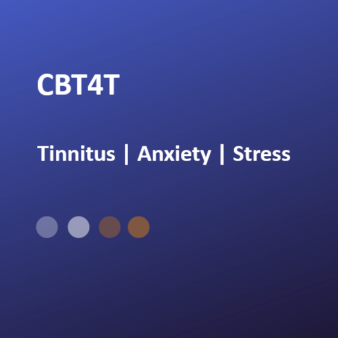Sarah, UK
7 weeks post enrolment: Tinnitus Functional Index reduced from 58.4% > 22.4% (category 4 big problem > category 2 small problem)
Following these repeat measures and a first appointment, Sarah's feedback is:
Q: The progress I have achieved indicated in my stage 4 repeat Tinnitus Functional Index (TFI):
A: "My progress was more than I was expecting when I enrolled on CBT4T"
Q: The progress I have achieved indicated in my stage 4 repeat Anxiety/stress Symptoms (ASQ):
A: "My progress more than I was expecting when I enrolled on CBT4T"
Q: Would you recommend CBT4T to others looking for help, based on your experience of the course so far, and why?
A: "Yes, I would recommend the course. It is affordable too, which is an important factor for most of us."
What do you believe to have been the most impactful aspect(s) up to Stage 4 for you? Choose as many as you like:
Sarah says:
1. Breathing exercises
2. Physiological exercises (9 minutes)
3. Guided relaxation (30 minutes)
4. Learning about the Amygdala
5. Understanding more about the Change Process
6. Recognising how many 2nd, 3rd, 4th etc “Arrows” cause you emotional distress
7. Recognising how much Cognitive Distortions cause you emotional distress
8. There is a difference between having a Problem-oriented perspective and a Recovery-oriented perspective
Of the above impactful aspects you have chosen, pick your top three (or more) in order of importance for you
Sarah says:
First: Learning about the Amygdala.
Second: Learning how much Cognitive Distortions cause me emotional distress.
Third: Breathing exercises.
Fourth: Guided relaxation.
Fifth: Physiological exercise
Are there any further aspects that you would like to add?
Sarah says:
"About Cognitive Fusion, Adaptive Cognitive Fusion and brain plasticity, these allowed me to believe I CAN reduce my tinnitus stress. I also found the 1-1 very useful. It was reassuring to meet Debbie, and gave me an opportunity to ask questions."
In your own words, please write about your experiences so far (up to Stage 4/starting Stage 5)
Sarah says:
"So far, I have good positive experiences. It was really important for me to understand what is happening inside my brain. If you understand why something has happened, you can do something about it. The course has proved to me, that something can be done about my perception of my tinnitus. It does take time, effort and persistence and sometimes It is difficult to fit it all in sometimes, but I am giving it my best shot."
